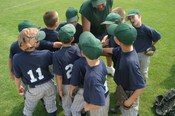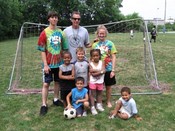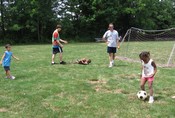GOALS
 Remember the George Allen quote adopted by every high school football coach? “Football is like the game of life.” When I was a young athlete, that old cliché really irritated me. Sports were supposed to be fun. And the game of life … well, that was something else.
Remember the George Allen quote adopted by every high school football coach? “Football is like the game of life.” When I was a young athlete, that old cliché really irritated me. Sports were supposed to be fun. And the game of life … well, that was something else.
Then I grew up, had kids of my own, and became a recreation league coach of football and several other sports. I have not used Mr. Allen’s cliché myself, but I have learned the real wisdom behind it. When youth sports are coached well, they do help kids to learn how to live a good life.
Regardless of the sport or the age of the child, there are three fundamental lessons a coach should teach, summarized as Self, Group and Fun.
- Self: I get better at something when I work at it.
- Group: I am responsible to others and they are responsible to me.
- Fun: I can enjoy life through physical activity and community.
Now don’t get me wrong. I don’t lecture players about becoming “fully realized personalities” or “more responsible members of the world community.” We never mention such weighty subjects at practice. What I do is to try to keep these higher purposes in mind as I structure practices. Kids will learn about themselves and their relationship to the team, and then apply these lessons to other relationships and to their daily lives.
VICTORY AND DEFEAT
It isn’t necessary to win games for kids to learn these lessons, but it does help. A victory is a tangible reward for their efforts and proves that it has been worthwhile. Still, of the two philosophies, I favor the traditional, “It’s not whether you win or lose, but how you play the game,” over Lombardi’s “Winning isn’t everything, it’s the only thing.”
Of course when I play or coach, I really want to win. Fortunately, I have found over the years that if coaches and players follow certain guidelines, they do tend to win games.
But even in defeat, the coach and players tend to absorb the loss into a larger experiential context. Experiencing defeat is part of life – for most of us, a regular part. It’s a valuable lesson if players learn that effort and group solidarity enhance the enjoyment of playing well– even for a losing cause.
GUIDELINES
Practice is often the best time to teach the three fundamental objectives of Self, Group and Fun. In order to balance the three, use the following guidelines:
Work on the fundamental skills required for the individual player to play well. Once at a sports banquet I attended, then Indiana University basketball coach, Bob Knight, told us that the most important ingredient in developing a basketball player’s ability are the “fundamentals.” Whether you like or dislike Bob Knight, you cannot argue with the evidence of his success in bringing out the best in players by drilling them on the fundamentals of basketball. This is especially helpful for younger players who have just been introduced to a sport.
Spend time individually with each player working on their weak points and encouraging any potential talents. This element of practice may be blended with fundamental skill work. On the one hand, every child has areas of play that need improvement. On the other, most kids like some aspect of the game best, and practice should be a means for kids to enjoy their favorite part of the sport. Engage players in group activities that require teamwork to accomplish common goals. Social psychologists discovered years ago that disunited individuals and diverse groups may be brought together when circumstances create “super-ordinate goals.” In English, that means sharing a common goal brings people together. Any drills that require two or more players to cooperate to achieve something, such as running a relay or set plays, create super-ordinate goals for the players. A simple illustration is to take four runners and require that they pass a baton. Runners have to work together to make a relay work. Achieving common goals through collective action is the essence of teamwork.
 Teach players that each of them has a responsibility to the team to try to play well and that the team has a responsibility to recognize each player’s contribution. Christopher Lasch points out in his book, The Culture of Narcissism, that focusing on self-aggrandizement usually leads to unhappiness rather than glory. Considering the attention advertisers and the media pay to individual sports stars, it’s an uphill battle to convince kids they’ll be most happy within the context of a team, i.e., being a “team player.” But kids need to learn that for effective teamwork, each player must play hard no matter what the role. That may mean being the player who is set up to score, or it may mean donning heavy and self-effacing gear of goalie or catcher. A team needs each position to be played for the team At a sports banquet I attended in high school, the legendary coach John Wooden put it something like this: “There may be no ‘I’ in team, but the team is a team when all the “me’s” become “we.”
Teach players that each of them has a responsibility to the team to try to play well and that the team has a responsibility to recognize each player’s contribution. Christopher Lasch points out in his book, The Culture of Narcissism, that focusing on self-aggrandizement usually leads to unhappiness rather than glory. Considering the attention advertisers and the media pay to individual sports stars, it’s an uphill battle to convince kids they’ll be most happy within the context of a team, i.e., being a “team player.” But kids need to learn that for effective teamwork, each player must play hard no matter what the role. That may mean being the player who is set up to score, or it may mean donning heavy and self-effacing gear of goalie or catcher. A team needs each position to be played for the team At a sports banquet I attended in high school, the legendary coach John Wooden put it something like this: “There may be no ‘I’ in team, but the team is a team when all the “me’s” become “we.”
Play the game. Kids join a team to play. Practicing sports help kids grow in many ways, but sports should always include an element of fun. And what’s most fun about sports is playing.
Encourage kids to practice on their own and continue to play sports in the future. Two images Americans love are: an inner-city kid on a cracked concrete court working his jump shot over and over through a netless rim; or a farm boy whacking a baseball against the door of a desultory barn until the cover is worn off the ball and the paint off the door. We appreciate these images because they stir in us the picture of love of sport. But developing love of a sport takes more than just going to practice. Even those kids who will never be standouts will feel better about themselves if they come back next season with an improved backhand or a better curve ball. They’ll also be more appreciated by the team. And most importantly, a kid who learns that sports can be enjoyed outside of organized athletics has a lifetime of fun ahead of him.
A TYPICAL PRACTICE
Consider a typical practice I conducted with the last soccer team I coached for six-year olds.
First, we do a little running and stretching. Next, we form a circle and work on proper passing technique. At the same time, I quiz the kids on the names of their teammates. Learning everyone’s name becomes fun, because it is associated with play.
 Next is drilling on individual skills. Proper kicking and passing is repetitively practiced. I try to remind each player of the fundamentals, such as “keep your eye on the ball as you kick” and “strike the ball at the bottom of your big toe.” While giving these instructions, I run the kids through exercises requiring them to aim their kicks at targets or to use their left foot for kicking. I try to keep drills interesting, but focused on fundamentals.
Next is drilling on individual skills. Proper kicking and passing is repetitively practiced. I try to remind each player of the fundamentals, such as “keep your eye on the ball as you kick” and “strike the ball at the bottom of your big toe.” While giving these instructions, I run the kids through exercises requiring them to aim their kicks at targets or to use their left foot for kicking. I try to keep drills interesting, but focused on fundamentals.
Skills drills are work, but the fun comes with getting better. I can see the delight on a kid’s face as she kicks the ball farther than she did the last practice. I praise her – not just for kicking well, but for working hard and improving. For the kids, then, the payoff of their hard work is evident in that moment of success.
The teamwork phase of practice is comprised of drills, set plays or relays requiring cooperation among the players. When they work on plays or run relays, the kids directly experience the necessity of cooperation to achieve a common goal. Think of the movie “Hoosiers.” The coach, played by Gene Hackman, forbid any player from taking a shot at the basket until the ball had been passed at least four times. Eventually the players realized that teamwork made scoring easier for each player. If you have to pass the ball four times before anyone can even try to score, eventually you will come to associate passing (cooperation) with scoring.
On the other hand, the kids joined the team to play the sport, not just to drill and learn to cooperate. So, we always have a practice game after group drills. (For individual sports such as swimming or track, this can be more difficult. The kids can’t go through an entire meet at the end of practice. But they can play related games such as water polo or shot-put relays. Any activity that incorporates the sport into a fun event involving the whole team will work.)
Finally, at the end of practice, I talk to the players. What are their concerns? What are my concerns as coach? I try to give practical advice about improvements the players and the team can make. And I always encourage them to play the sport outside of practice. Finally, we do our “huddle up” ritual: We gather in the middle of the field, put our hands together, and yell, “Goooooo Lazers!”
FAITH AND VALUES
Most of my coaching has been done in a secular context. Even the YMCA and church leagues in which I have coached have rules prohibiting evangelism by the coaches. But the principles of Christian community and ethics are obvious in the coaching guidelines I use. As a coach, I am concerned about the development of each member of the team, just like a minister is concerned about the spiritual development of his parishioners. The team, when it works as a team, is like a church – as the Apostle Paul describes it – with all parts working together. And playing a sport is like living a faithful life. It is challenging, fun, develops the self, and promotes communal cooperation.
Without being explicitly evangelistic, coaching offers a wonderful and rewarding opportunity to teach and show by example the Christian faith. Your faith will show through in the way you conduct yourself with your players, their parents, other coaches, and referees. Abusive or tyrannical behavior by a coach, who is supposedly a Christian, does not shine a light toward Christ and reveals the coach as a hypocrite.
I would encourage every Christian woman and man who has enjoyed athletics in their own lives to take up the challenge of coaching. Not only is it an opportunity to pass on our values to the next generation, but it’s … well, like the game of life.
 Jeffrey S. Rasley practices law in Indianapolis, Indiana. He was admitted to the Indiana and U.S. District Court Bars in 1979 and later to the U.S. Supreme Court Bar. Rasley has published numerous articles and photos in academic and mainstream periodicals, including Newsweek, Chicago Magazine, ABA Journal, Family Law Review, Pacific Magazine, and Indy’s Child. His hobbies include Himalayan mountaineering and solo-sea kayaking. He plays in two volleyball groups and works out regularly at the YMCA. Rasley is married to Alicia and has two sons, James and Andrew. He has coached soccer, basketball, football, baseball, and swimming in school, city, park, and YMCA youth leagues. Rasley can be reached at jrasley@juno.com .
Jeffrey S. Rasley practices law in Indianapolis, Indiana. He was admitted to the Indiana and U.S. District Court Bars in 1979 and later to the U.S. Supreme Court Bar. Rasley has published numerous articles and photos in academic and mainstream periodicals, including Newsweek, Chicago Magazine, ABA Journal, Family Law Review, Pacific Magazine, and Indy’s Child. His hobbies include Himalayan mountaineering and solo-sea kayaking. He plays in two volleyball groups and works out regularly at the YMCA. Rasley is married to Alicia and has two sons, James and Andrew. He has coached soccer, basketball, football, baseball, and swimming in school, city, park, and YMCA youth leagues. Rasley can be reached at jrasley@juno.com .Photos courtesy of Jeff Rasley.





